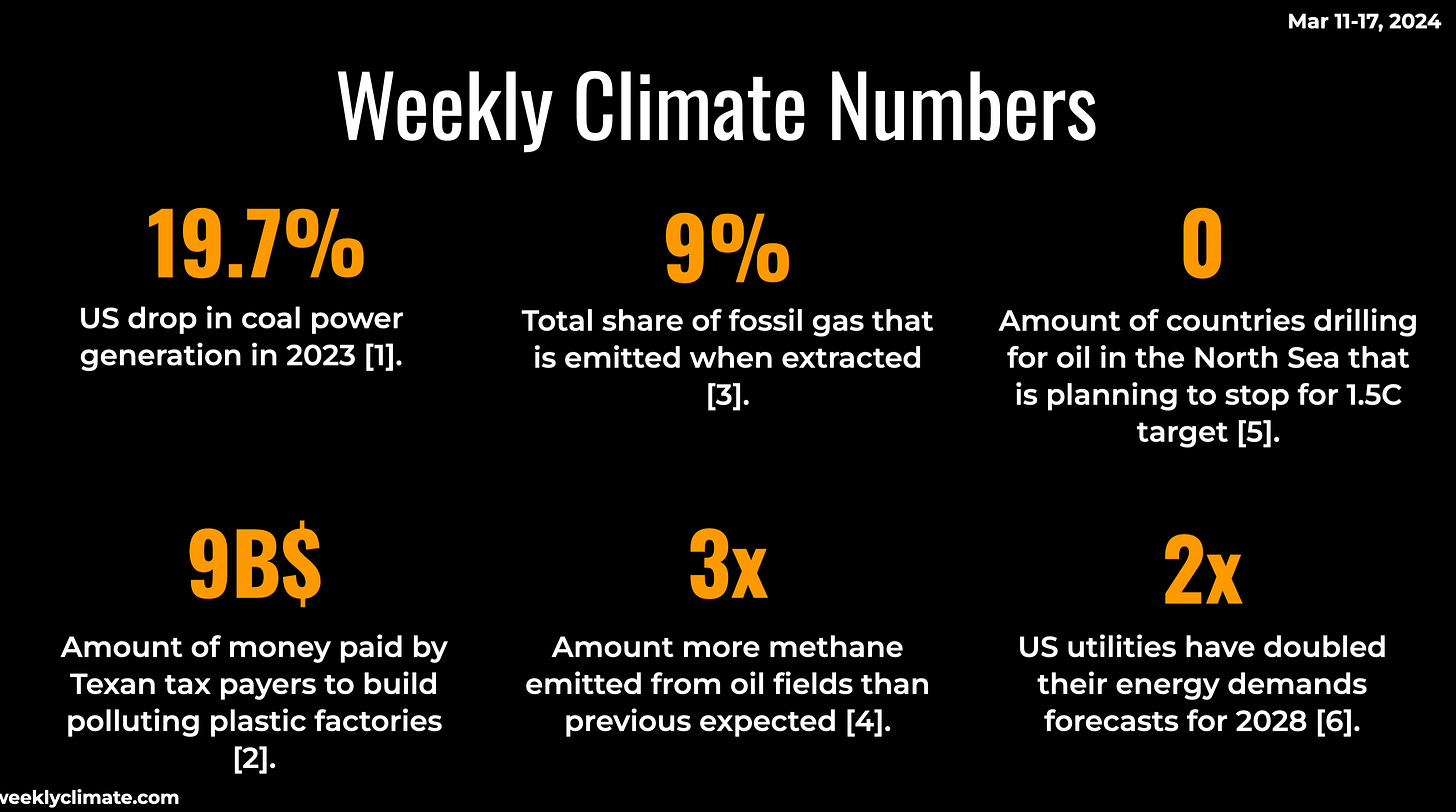THE BRIEF [Mar 11-17'24]
Climate adaptation less effective in warming world, UK emissions lowest levels since 1879, vehicle-to-grid is the future, steady as she goes for North Sea oil drilling countries.
Welcome to this week’s edition of The Weekly Climate 🎉
References: [1], [2], [3], [4], [5] and [6].
If you’re only getting The Brief but want to get the full version of the newsletter be sure to upgrade your plan to paid. Check out the preview that you will receive to see why more than 30 people think it’s worth paying for. And see a recent week’s full newsletter for details for why I decided to go paid.
If you’re getting both: Thank you so much for deciding to upgrade to go paid 🙏. And thanks to everybody for reading my newsletter regardless of which version you read 🤗.
‼️News you can’t miss
Here’s one important scary/bad (🙀), good (😻), interesting (😼) and fossil (💩) news item.
🙀 Study suggests climate adaptation efforts become less effective the warmer the planet becomes
😻 UK emissions dropped to the lowest level since 1879 in 2023
😼 Vehicle-to-Grid is the future of grid stability
💩 No big North Sea fossil fuel country is planning to stop for 1.5C target
This week’s highlights
[#fashion] — This article discusses the potential of bio-based textiles to replace plastic in clothing. It highlights various materials, such as fabrics made from apple waste, shrimp shells, old cotton, and enhanced cotton. The article also mentions the use of lab-grown spider silk and the production of lyocell, a semi-synthetic fiber. These innovative materials offer a glimpse of a plastic-free future for textiles, addressing the issue of microplastic pollution.
[#palmoil] — The European Union's ban on imports linked to deforestation has sparked controversy, particularly from developing countries like Malaysia and Indonesia, which supply a significant portion of the world's palm oil. These countries argue that the ban puts their economies at risk and is a form of economic protectionism. Tracing the origins of products and proving compliance with the ban is complex and expensive for small suppliers. The ban reflects a tension in the economics of climate change, where lower- and middle-income nations bear the cost of environmental shifts caused by wealthier nations. The palm oil dispute highlights the challenges of balancing climate policy with economic and political trade-offs.
[#livestock] — A new study reveals how the livestock industry strategically downplayed the findings of a United Nations report on the industry's greenhouse gas emissions. The industry has worked with academic specialists to shape public opinion and policy in its favor, resulting in limited regulation and continued environmental impact. The study highlights the influence of industry funding on university research and the role of experts in shaping public perception.
That’s it for this week folks!
If you want more details or simply think my newsletter rocks remember that you can always go paid to get the full version of the Weekly Climate. But before you do, ask yourself this question: Does it provide you with 1.25$ worth of value every week? Obviously I think it does. In fact I really hope that just the time alone I save you should easily cover those 1.25$. Don’t hesitate to ping me on michael@weeklyclimate.com or comment below with any questions, feedback or comments regarding this.
Remember if you’re feeling down, angry or sad from some of the news in this newsletter one cure is to act. And one way you can always act that also happens to be one of the most powerful things you can do is to talk about it. That also works if what you just read made you hopeful or happy btw.
If you enjoyed this newsletter don’t forget to share it with your friends, coworkers or other people you think could benefit from getting it. If you got directed here by a friend or another link on the Internet don’t forget to subscribe!
See you all next week 👋

